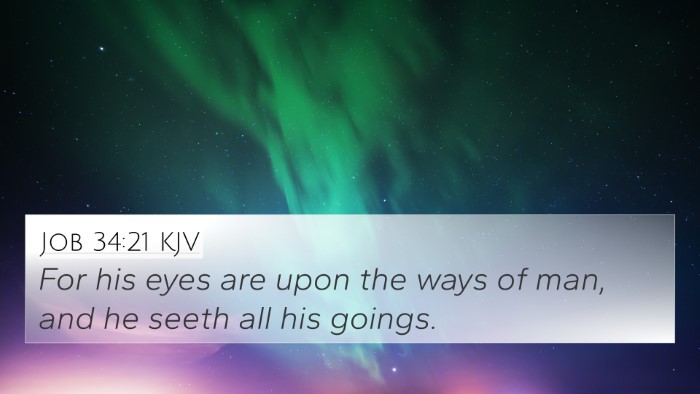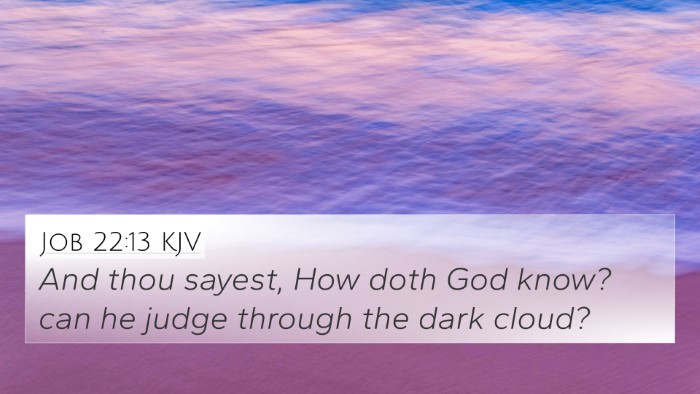Old Testament
Genesis Exodus Leviticus Numbers Deuteronomy Joshua Judges Ruth 1 Samuel 2 Samuel 1 Kings 2 Kings 1 Chronicles 2 Chronicles Ezra Nehemiah Esther Job Psalms Proverbs Ecclesiastes Song of Solomon Isaiah Jeremiah Lamentations Ezekiel Daniel Hosea Joel Amos Obadiah Jonah Micah Nahum Habakkuk Zephaniah Haggai Zechariah MalachiJob 11:11 Similar Verses
Job 11:11 Cross References
For he knoweth vain men: he seeth wickedness also; will he not then consider it?
Uncover the Rich Themes and Topics of This Bible Verse
Listed below are the Bible themes associated with Job 11:11. We invite you to explore each theme to gain deeper insights into the Scriptures.
Job 11:11 Cross Reference Verses
This section features a detailed cross-reference designed to enrich your understanding of the Scriptures. Below, you will find carefully selected verses that echo the themes and teachings related to Job 11:11 KJV. Click on any image to explore detailed analyses of related Bible verses and uncover deeper theological insights.

Hebrews 4:13 (KJV) »
Neither is there any creature that is not manifest in his sight: but all things are naked and opened unto the eyes of him with whom we have to do.
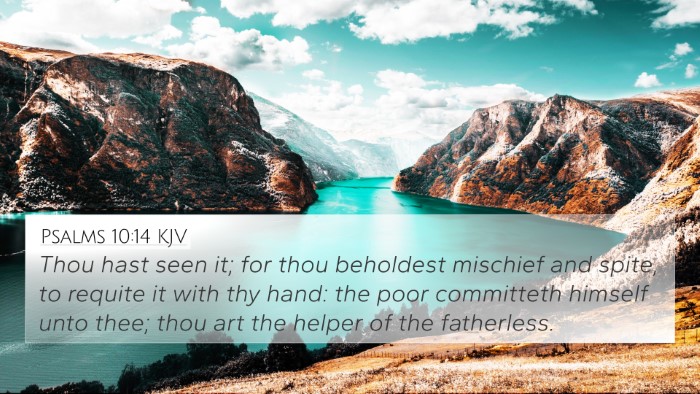
Psalms 10:14 (KJV) »
Thou hast seen it; for thou beholdest mischief and spite, to requite it with thy hand: the poor committeth himself unto thee; thou art the helper of the fatherless.

Revelation 2:23 (KJV) »
And I will kill her children with death; and all the churches shall know that I am he which searcheth the reins and hearts: and I will give unto every one of you according to your works.

Habakkuk 1:13 (KJV) »
Thou art of purer eyes than to behold evil, and canst not look on iniquity: wherefore lookest thou upon them that deal treacherously, and holdest thy tongue when the wicked devoureth the man that is more righteous than he?
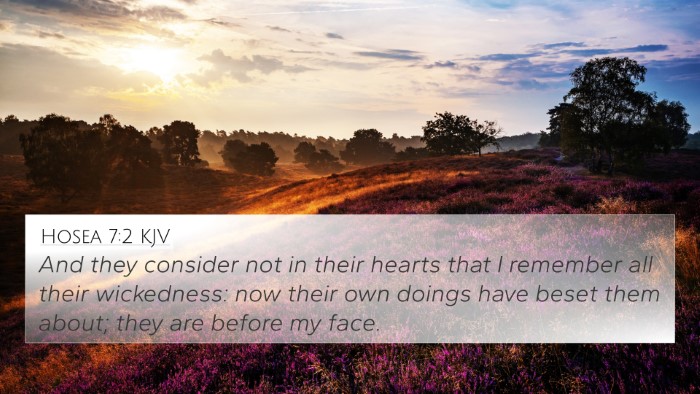
Hosea 7:2 (KJV) »
And they consider not in their hearts that I remember all their wickedness: now their own doings have beset them about; they are before my face.

Jeremiah 17:9 (KJV) »
The heart is deceitful above all things, and desperately wicked: who can know it?
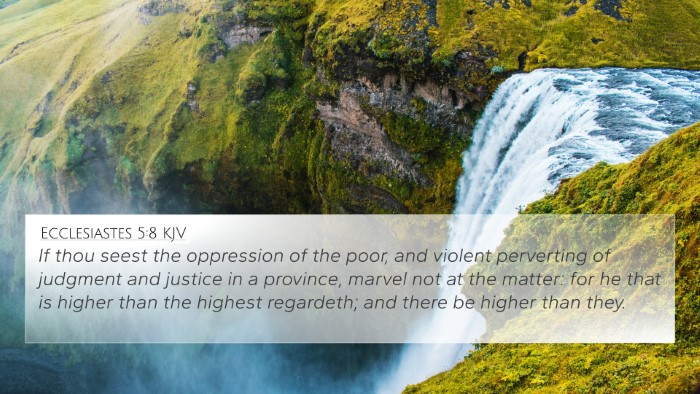
Ecclesiastes 5:8 (KJV) »
If thou seest the oppression of the poor, and violent perverting of judgment and justice in a province, marvel not at the matter: for he that is higher than the highest regardeth; and there be higher than they.

Psalms 10:11 (KJV) »
He hath said in his heart, God hath forgotten: he hideth his face; he will never see it.
Job 11:11 Verse Analysis and Similar Verses
Job 11:11 states, "For he knoweth vain men: he seeth wickedness also; will he not then consider it?" This verse is part of Zophar's speech to Job, wherein he seeks to express God’s absolute awareness of humanity’s moral standing and the implications that have for Job.
Understanding this verse requires examining the character of God as depicted in the book of Job and its broader themes of suffering, divine knowledge, and human folly. The insights from public domain commentaries enhance our understanding by showcasing several key aspects.
Interpretation and Explanation
- God’s Omniscience: As Matthew Henry points out, this verse highlights God's knowledge of human behaviors, especially the sinfulness and witlessness of mankind. Zophar asserts that God sees through the exterior of individuals into their hearts, knowing their intentions even if hidden from human insight.
- Warning Against Presumption: Adam Clarke elaborates on Zophar’s implication that both Job and other 'vain men' should be cautious. The verse serves as a reminder not to presume upon the mercy of God while living in sin, as God’s discerning eye is watching continuously.
- Plea for Repentance: Albert Barnes relates this to the overarching theme of Job’s need for repentance. Zophar is admonishing Job, suggesting that his misfortunes may have stemmed from unacknowledged sins, thus presenting a call to humility and submission to God.
Connections with Other Scriptures
This particular verse opens discussions on several parallel themes found throughout Scripture. Here are some notable cross-references that complement Job 11:11:
- 1 Samuel 16:7: "For the LORD seeth not as man seeth; for man looketh on the outward appearance, but the LORD looketh on the heart." This mirrors the theme of God’s deep understanding of our true nature.
- Psalm 139:2: "Thou knowest my downsitting and mine uprising, thou understandest my thought afar off." This emphasizes God’s omniscience in knowing our every thought and action.
- Proverbs 15:3: "The eyes of the LORD are in every place, beholding the evil and the good." This echoes the idea that God is ever observant of moral conduct.
- Hebrews 4:13: "Neither is there any creature that is not manifest in his sight: but all things are naked and opened unto the eyes of him with whom we have to do." This verse relates closely to Zophar’s claim about God’s perception of human wickedness.
- Galatians 6:7: "Be not deceived; God is not mocked: for whatsoever a man soweth, that shall he also reap." This introduces the theme of consequences tied to one's actions.
- Jeremiah 17:10: "I the LORD search the heart, I try the reins, even to give every man according to his ways, and according to the fruit of his doings." This supports the certainty of God’s judgment based on inner thoughts and actions.
- Romans 2:16: "In the day when God shall judge the secrets of men by Jesus Christ according to my gospel." This provides a New Testament connection to the idea that God challenges our hidden sins and motivations.
- Proverbs 24:12: "If thou sayest, Behold, we knew it not; doth not he that pondereth the heart consider it? and he that keepeth thy soul, doth not he know it?" This underlines the inconceivability of being oblivious to God’s understanding of our nature.
- Matthew 12:36: "But I say unto you, That every idle word that men shall speak, they shall give account thereof in the day of judgment." This shows the far-reaching implications of God's awareness of our words and actions.
Thematic Analysis
This verse, and the themes within it, allow for an extensive comparative Bible verse analysis. The idea that God is intimately acquainted with human hearts paves the way for numerous reflections on human morality and divine judgment.
- Human Nature and Sinfulness: Job 11:11 reinforces the biblical notion of humanity's innate sinfulness, a theme explored in both the Old and New Testaments.
- Divine Justice: The text foreshadows the spiritual truth of God's justice, inviting believers to reflect on their lives before a holy God.
- Hope and Restoration: While the first part of the chapter may seem disheartening, there is an underlying promise of hope and redemption for those who recognize their failings and seek God's forgiveness, a theme prevalent throughout Scripture.
Conclusion
Job 11:11 serves as a powerful reminder of God’s omniscient nature and His ability to perceive the truth in human hearts. By engaging with this verse and its connections, believers can prudently explore the depths of God’s knowledge and the implications of human actions in light of divine discernment.
In summary, understanding Job 11:11 through various commentaries allows for richer reflection and an appreciation of its theological significance. By exploring cross-references, one can see the interconnectedness of themes pertaining to divine knowledge, human folly, and the need for repentance and humility.






